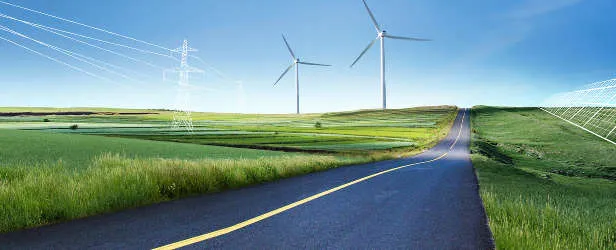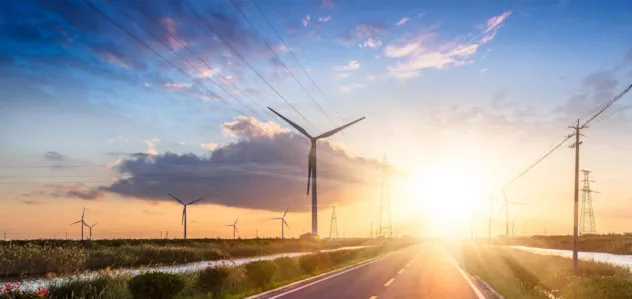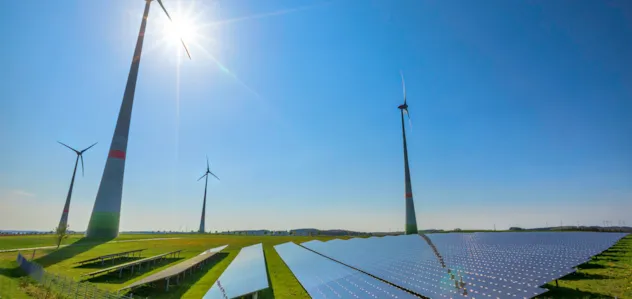May 24, 2018 | Podcast
Dubai: Looking beyond oil
Transcript:
Transcript:
NARRATOR Welcome to the DNV Talks Energy podcast series. Electrification, rise of renewables and new technologies supported by more data and IT systems are transforming the power system. Join us each week as we discuss these changes with guests from around the industry.
Transcript:
MATHIAS STECK Welcome to a new episode of DNV Talks Energy here from the Global Smart Energy Summit in Dubai. My guest today is Graeme Sims, the Executive Director of Dubai’s electricity and water regulator RSB. Welcome, Graeme.
Transcript:
GRAEME SIMS Thank you very much for having me.
Transcript:
MATHIAS STECK Graeme, today we want to talk about the transformation of the energy sector in Dubai, but before we get to this it would be great if you could introduce yourself as a person, as well as RSB.
Transcript:
GRAEME SIMS Sure. Well I'm a UK citizen. I've been working in the regulation utilities for over 25 years now. I joined Britain’s electricity regulator back in the early 90s, pretty much at the ground floor of the privatization of the electricity supply industry in Britain, which gave me I think a fantastic exposure to the range of issues associated with privatizing, deregulating, introducing competition into power systems. After doing that for a few years I moved to Abu Dhabi in the later 90s, where Abu Dhabi was going through its own restructuring and privatization initiative. I was there for a few years, established Abu Dhabi’s regulatory body. Went back to the UK for a bit over a decade, to work for a utility company, and I came back out to the UAE about six years ago, and I've been working in the regulatory body here in Dubai ever since then.
Transcript:
MATHIAS STECK Thank you. Could you explain a little bit what RSB stands for?
Transcript:
GRAEME SIMS Yes, so sorry. RSB is Regulatory and Supervisory Bureau, which is why we abbreviate it to RSB all the time.
Transcript:
MATHIAS STECK Right okay. Well, you just mentioned you have some history here in the region, can you look back a bit at the time you arrived here first, what has happened until now, when it’s leading up to the transformation we will see in the future?
Transcript:
GRAEME SIMS Sure. Well, Abu Dhabi was I think very progressive. In the late 90s there were no independent power projects in this part of the world, so, Abu Dhabi introduced the first IWPP, that was a combined power generation desalination plant. It completely restructured its existing electricity industry, separating it both vertically and horizontally, introduced an independent regulatory body. I guess at that time the drivers were very much around improving efficiency, dealing with extremely high rates of demand growth, you’ve seen double-digit demand growth in Abu Dhabi in the run up to the late 90s, and coming at increasing cost. I guess what’s changed since then is the focus on environmental issues has become so much more prominent. When I first started working as a regulator, people worried a little bit about energy efficiency, but it had nothing like the prominence it does now, and certainly back in the 90s, no one was particularly thinking, in this part of the world, about a role that renewables might play.
So, the last six years here in Dubai have been very different, there’s far more focus on energy efficiency than there was, and renewables are assuming an increasing importance in the power supply mix of today, and of the coming decades.
Transcript:
MATHIAS STECK Right. You mentioned the rapid growth. If you talk about a regulator sometimes the perception might be that that is rather slowing things down. But from your experience how did you as a regulator, or RSB as a regulator, manage to support this growth?
Transcript:
GRAEME SIMS Well, the growth was simply social and economic development of the country. The power supply system was growing with increased population, increased economic activity, it certainly wasn’t the job of the regulator to in any way inhibit that. But rather to make sure that the system grew in a sensible way, that there were decent estimates made of demand growth, challenging when demand growth is very high, that costs were kept under control. And its service wasn’t lost sight of in all that as well, given the pressures that were bound to be on the utility simply to deliver the power requirements.
Transcript:
MATHIAS STECK Right. This area or this region are certainly a little bit specific with its features, but nevertheless, we see megatrends like urbanization, you will see that cities get more and more people coming, so other city will face probably similar challenges. Maybe not in the time span, but are there any specific learning experience you can share for others?
Transcript:
GRAEME SIMS I think there are some. One interesting feature of Dubai, and in fact Abu Dhabi, is the extent of which they’ve introduced district cooling schemes into the urban environment. So, much of Europe has got large-scale district heating schemes, which are, I think in many cases, very old. But Dubai and Abu Dhabi recognize quite early on that there was some value to having large-scale centralized cooling systems.
So, the centre of Dubai, to downtown Dubai is all supplied by large-scale plant with a piped network of chilled water pipes connecting buildings. That’s been very successful here, so, it has something of the order of 20% of all cooling in Dubai is supplied in that way. I think in other respects what has happened recently, the way renewables have been introduced I think has been particularly well thought through, so, there’s been competitive pressure brought to bear all the time on renewable costs. So, Dubai did not adopt a feed-in tariff where the government attempted to guess what was a sensible price for renewables; instead, it went down the route of competitively tendering, and each competition that Dubai has run for large-scale renewables has delivered what the time has been seen as a global leading benchmark price, one after the other.
Transcript:
MATHIAS STECK So, that’s an interesting point also because it means there’s transformation required also on the utility side, so we see of course more and more integration of renewables into the grid worldwide, we also see that more local production and local consumption is coming, so, that has an impact on the grid. How are the utilities here dealing with this?
Transcript:
GRAEME SIMS Well, I think because there hasn't been the same subsidy approach to renewables, we haven't seen quite the same very rapid uptake of renewables, particularly in term of distributed generation, as you’ve seen in parts of Europe, Germany perhaps most notably, with solar. So, it’s probably a rather more measured approach, and as a result I think Dubai is having the opportunity to work out just how best to manage those challenges. Only recently has it awarded its first combined solar power project, and that project is intended not to generate during the sunshine hours, but to generate outside of the sunshine hours, by storing its energy.
There’s a development underway of a pump storage scheme, up towards the border with Oman, which again, will be a way of potentially storing surplus PV power during the day for use at night. There is a rooftop solar scheme, but that’s very much being driven by the economics of rooftop solar versus power prices here. So, I think there’s been an approach of working out the likely solutions, but not fortunately being faced with having to chase the issue, and certainly find oneself with a grid which has been overwhelmed by renewables, and creating problems. I think we can instead anticipate the sorts of issues which are likely to arise, and to some extent learn from the experience of others in Europe and elsewhere.
Transcript:
MATHIAS STECK Right. I’d like to talk a little bit about more and more data being available in the energy sector. What do you think are the advancements, or what are the advancements actually, in this region, to make more use of data? Going towards a more interactive use maybe with the user, the generator, are there any projects going?
Transcript:
GRAEME SIMS Yes, there are some steps in that direction. DEWA, which is the power supply and water supply company for Dubai, is starting to develop benchmarks, so the neighbourhood type benchmarks, and intends in time to give people information on their bills about how their consumption compares to consumption of their neighbours. That’s an approach which it seems as being quite effective, actually, in stimulating activity, because people are naturally competitive, and don't like the idea that their neighbour is being more efficient than they are. So, that’s been shown to work. We already get quite good information, meters are read routinely every month, and you can easily find information on your consumption month by month for the past few years. So, you can track your own consumption, but I guess this will be further step to start to say, well, how does that compare to others occupying similar sized properties. There’s a smart meter roll-out program, and over time the utilities will acquire far more information themselves. I know they’re looking at how they might use machine learning, artificial intelligence, techniques like that, which are capable of being applied to the potentially vast amounts of data that smart systems will start to generate.
Transcript:
MATHIAS STECK So, we talked about the rapid growth in the past. We talk about all these exciting things, renewables, digital. If you would look out for the next one or two decades, what are the big projects now for Dubai, or for the region, to adopt?
Transcript:
GRAEME SIMS Well, I think the trend here, certainly in this part of the world, will be to even greater electrification of the economy, if you like. We have a much more electrified economy already because it’s a cooling-driven economy, rather than a heating-driven economy; but we still have road transportation, which is dependent on fossil fuels. It seems very likely we’ll go down the route of electric vehicles.
Almost certainly the predominant source of energy will be solar in this part of the world. There aren’t equivalently good wind resources or other forms of renewables. So, that seems to be for this part of the world at least, a fairly clear trend. I think other parts of the world may end up with slightly different variants on that, depending on the nature of electricity or energy demand. So, the UK, for instance, may not go fully electric because of space heating requirements, and the existence of a gas network, and so on.
So, I don't think the model here will work for everywhere, but I think perhaps for sunny countries, with a high-cooling load, you can see that the way Dubai’s going is probably going to be mimicked in much of the rest of the world in the next few decades.
Transcript:
MATHIAS STECK Yes. It’s interesting that there’s quite a radical shift in the energy sources. This region was very much known for oil, how do you see this balancing out?
Transcript:
GRAEME SIMS Well, it’s a balance. The economies of the region of the entire Gulf Cooperation Council are still very dependent upon fossil fuels for government revenues, for overseas revenues. I guess what they and we have to hope for is a sensible transition away from those; I think the government here is very conscious that there is going to be such a thing as life after oil, and is very keen to make the point to the local populous, that they have to be ready for a life after oil – which means making your way in the world in a rather different way. So, then actually I’d say the UAE in particular has been a particularly enthusiastic adopter of these new technologies, for so long as oil is being used in the world, and probably will be in significant quantities for a few more decades, then I think they have the opportunity to make that transition, and for that transition to be financed from those resources.
Transcript:
MATHIAS STECK Graeme, since we are here at the Global Smart Energy Summit in Dubai, I also would like to take the opportunity to ask you what you think the main themes here are, and what do you hope to take away from this event?
Transcript:
GRAEME SIMS I'm expecting a couple of main themes. One I think is the focus on the growth of renewables in the region, which has been very strong here in the UAE, but we’re starting to see big moves in Saudi in particular, which is a vast market.
The other issue, I’ll be speaking on a panel later, about subsidy reform. A topic which I've spoken about probably every year for the last six years that I've been here, but it’s probably only really taken hold in the last few years, and we’re now seeing very positive moves across the whole of the GCC to remove the distortions that have long been present in energy prices, and have made it very difficult to promote energy efficiency, and made it very difficult for unconventional technologies to compete with the conventional technologies.
Transcript:
MATHIAS STECK Graeme, thank you. It was a pleasure having you here. Thank you also to the listeners. That was Graeme Sims, Executive Director of Dubai’s electricity and water regulator, RSB.
Transcript:
NARRATOR Thank you for listening to this DNV Talks Energy podcast. To hear more podcasts in the series, please visit dnvgl.com/talksenergy.


